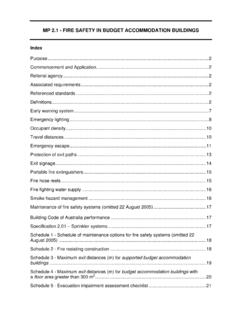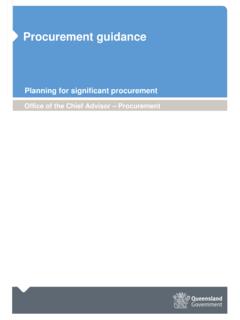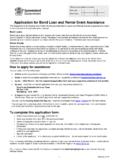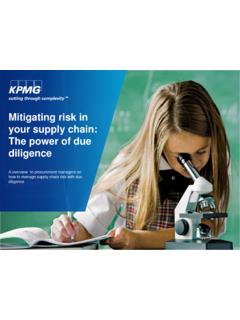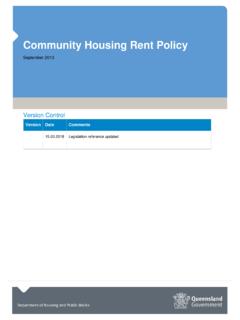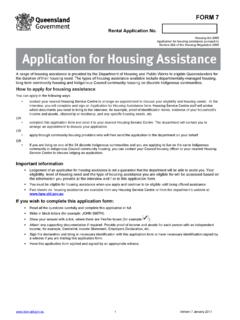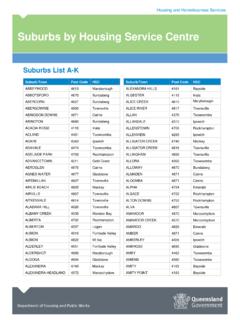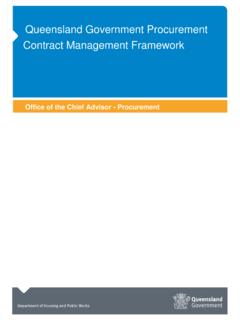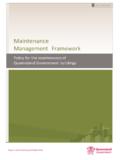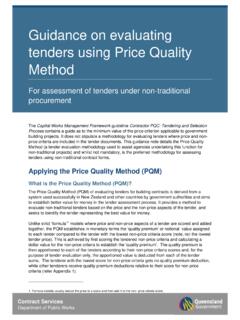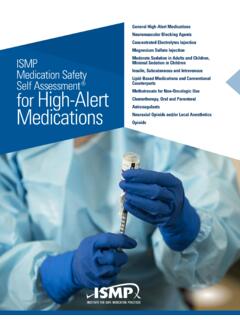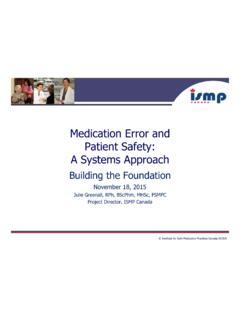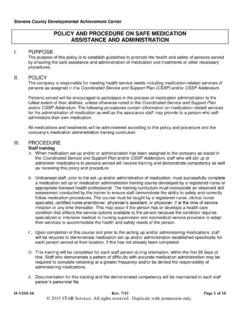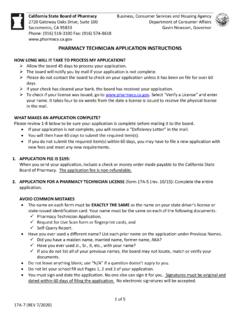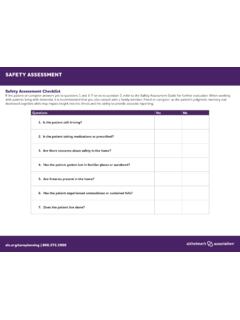Transcription of Guideline for Medication Assistance
1 Guideline for Medication AssistanceRESIDENTIAL SERVICE PROVIDERS (LEVEL 3 SERVICES)ContentsPurpose 1 Medication Assistance Compliance Checklist 2-31. Principles of quality use of medicines in level 3 residential services 4 Why is quality use of medicines important? 4 Achieving quality use of medicines in level 3 residential services 4 General principles for Medication Assistance Medical decisions Duty of care Written consent Privacy and confidentiality Record keeping and prescribed records Staff training Seven rights for safe Medication administration Storage of Medication and discrepancy reporting Secure storage of Medication by a resident Safe disposal of a resident s Medication Refusal to take Medication by a resident Dealing with and recording a Medication incident 92.
2 Assistance with Medication in level 3 residential services Packaging of Medication and directions Handling Medication Routes of administration for which Assistance may be provided Routes of administration for which Assistance should NOT be provided Residents who self-medicate When required Medication (pro re nata, PRN Medication ) Non-prescription (over the counter, OTC) Medication Complementary and alternative therapies Adverse reactions to Medication When a resident is temporarily off-site 133. Quality use of medicines activities Service agreement for supply of Medication and associated professional services Medication review Self-assessment Medication audits 154. Resources 15 APPENDICES ..16 Appendix 1: Written request/consent for Assistance with Medication 17 Appendix 2: Medication Record 18 Appendix 3: Medication Distribution Record 19-20 Appendix 4: Staff Training Record 21 Appendix 5: Medication Incident Report Form and Flowchart for responding to a Medication error 22-23 Appendix 6: Routes of administration for which Assistance can be given 24-25 Appendix 7: Medication Record (Temporarily Off-site) 26 Glossary.
3 27 Current at October 20211 PurposeThe Department of Communities, Housing and Digital Economy has developed this Guideline in consultation with Queensland Health and Crown Law, to ensure the health and safety and basic freedoms of people living in residential services across Queensland who request Assistance with their Medication . The purpose of the Guideline is also to support service providers to develop policies and procedures, implement safe practices and to minimise the risk of harm from inappropriate use of Services regulates privately-owned and operated boarding houses, aged rentals and supported accommodation, which are captured by the provisions of the Residential Services (Accreditation) Act 2002 (the Act). Residential services typically accommodate some of the most vulnerable Queenslanders, including people with an intellectual and/or psychiatric disability, drug and alcohol problems, brain injury, problems associated with ageing, social and economic disadvantage, and social main objects of the Act are to provide consumer protections to residents, to encourage continual improvement by service providers and support fair trading in the residential service industry.
4 The regulatory system establishes minimum standards for the provision of residential services, compulsory registration of service providers and three levels of residential service provider must be accredited at level 3 to provide a personal care service in the course of operating a residential service. The Act provides a definition of a personal care service , which includes regularly providing a resident with Assistance in taking Medication as noted in schedule 2 of the with Medication falls under the accreditation matter Assistance with Medication as outlined in section 7 of the Residential Services (Accreditation) Regulation 2018 (the Regulation), which states: If residents ask for help in taking their Medication in accordance with medical directions, help is given in accordance with the Guideline for Medication Assistance in residential services with level 3 accreditation published by the department on the department's website. The department received coroners reports outlining recommendations in relation to two cases of death in care, where a person was residing in a level 3 accredited residential service.
5 The coroners recommendations concern a number of matters including the management of Medication by level 3 accredited services. These include appropriate storage of Medication , distribution of Medication and recording of this process, advising doctors when Medication is not taken, documenting procedures, and audits to ensure Medication is being received regularly by Guideline outlines the criteria that the delegate of the Chief Executive considers appropriate to make a decision in relation to the level 3 accreditation standard for Assistance with Medication . During an accreditation assessment for level 3 services, the delegate of the Chief Executive takes into consideration the criteria set out in section 44 of the criteria include:1. the extent to which the service provider provides the personal care service in a way that meets the individual needs of the residents to whom the service is provided, protects their interests and maintains and enhances their quality of life generally, and2.
6 The suitability of the staff members providing the personal care with this Guideline will be a condition of accreditation as a level 3 residential services Assistance Compliance ChecklistTopicSelf-assessment questionsSection of this Guideline to refer to for information Do you have residents who have requested Medication Assistance ?Written consent Is there written consent on file for each resident who has requested Assistance with Medication ? , , Appendix 1 Privacy and confidentiality Does the service maintain privacy and confidentiality of each resident s Medication information? Have internal policies and procedures for Medication Assistance been developed?1 Is Medication information documented for each resident? , Appendix 2, 4, 6 Are forms used to record Medication doses taken for all regular and when required (PRN) medications? Are Medication Distribution Records checked regularly to ensure that doses have not been missed?
7 Is the required documentation kept for the period of time specified in the Regulation? (at least three years after the day the resident leaves the service) Is there a written procedure in place for assisting with Medication which complies with this Guideline ? , , , , training Are all staff who are involved with Medication Assistance appropriately trained? ( Assist clients with Medication ) Is training completed prior to commencing with responsibilities for assisting with Medication ? Are staff trained in first aid and CPR, and do they maintain a current certificate in first aid and CPR? Is ongoing education about Medication available to staff to update their knowledge? Is a record of staff training maintained? , Appendix 33 Medication storage, handling and labelling Are medications stored in a secure, lockable location, in original packaging or dispensed medications repackaged in a Dose Administration Aid (DAA) and in accordance with pharmaceutical storage requirements?
8 , , Are the keys to the storage in Are medications that may be needed urgently able to be accessed in a timely manner? Are all medications individually labelled by a pharmacist for each resident?1, , , Are all non-prescription medications ordered by a medical practitioner? Is there a procedure for making Medication doses available for a resident to use if they are temporarily off-site? , Appendix 6 Safe disposal of medications Is there a procedure for disposal of ceased, expired or unwanted medications? Are medications for disposal stored separately to medications in use, and returned promptly to the pharmacy? incidents Is there a written incident reporting procedure for staff to follow? , Appendix 4 Are Medication Incident Reports reviewed to identify potential areas that need to be addressed? Is there a procedure for managing refusal by a resident and missed doses? , Is there a procedure for managing a suspected adverse reaction to Medication ?
9 , Appendix 4 Quality use of medicines activities Have any quality use of medicines activities been implemented? written service agreement with pharmacy Medication review self-assessment Medication audit , Appendix use of medicines is one of the objectives of Australia s National Medicines Policy. While medications make a significant contribution to preventing and treating disease, increasing life expectancy and improving quality of life, they also have the potential to cause use of medicines aims to maximise the benefits and minimise the risks of harm from the use of medications. In the residential service sector this means assisting residents to use medications safely and effectively to get the best possible management of health conditions using Medication is an increasingly complex issue. In the residential service sector, residents may progress from low to high needs during their residency, have a greater number of illnesses and take multiple medications.
10 Residents of residential services often require more medications than those living in the community, and may need more than one Medication to manage each condition. This can present an increased potential for Medication interactions, adverse effects and other Medication -related quality use of medicines in level 3 residential servicesThe goal of managing illness with Medication is centred on achieving the optimum health outcomes for the resident and must focus on the safe and effective use of provision of Assistance to a resident with taking Medication in level 3 residential services ( Assistance with Medication ) is done: in response to a request from the resident (or authorised substitute decision-maker); and in accordance with medical directions as prescribed, the directions on the dispensed Medication label and any additional advice provided by authorised health professionals directly involved with the resident s care (doctor, pharmacist, nurse).
